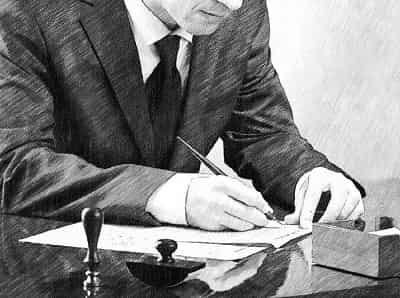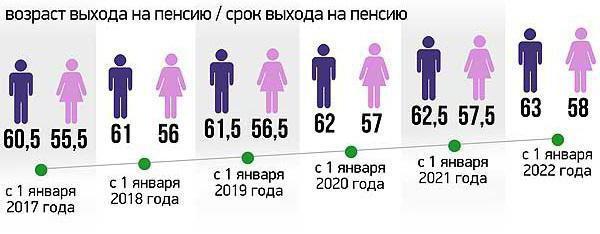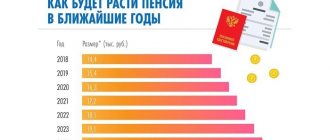Every year the budget deficit of the Pension Fund of the Russian Federation increases; billions of rubles are allocated annually from the Federal budget to cover it. To reduce the costs of the state budget, the Government of the Russian Federation is resorting to different methods of solving this problem. For example, the financial and economic blocs of the Government insist on the need to increase the retirement age for all citizens of the Russian Federation, while the social bloc strongly opposes this initiative. This issue has not yet been finally resolved, but for now the Government of the Russian Federation is resorting to other methods of reducing costs - this is an indefinite cessation of indexation of pensions for working pensioners, a “freeze” of pension savings, and an increase in the retirement age for civil servants.
Assignment of benefits
Every civil servant who fulfills all the conditions has the opportunity to receive a pension. According to the law, if the following conditions are met, a citizen can count on receiving a pension:
- at least 16 years of experience in the civil service;
- The retirement age for civil servants has been reached.
Upon dismissal, you can also apply for benefits if:
- There has been a reduction in staff or a government agency has been liquidated.
- Upon dismissal from a position.
- If the retirement age for civil servants has been reached.
- Due to poor health, which prevents further normal work activities.
Based on the functional and job characteristics of work, three types of civil servants are distinguished.
The first type is employees whose powers extend throughout the entire country.
The second type is employees whose work activity is limited to only one region.
The third type is military personnel and persons equivalent to them.
For each type there is a certain age, having reached which, you can safely retire to a well-deserved rest. On average it is defined as 60 years. At the request of the institution, the employee can work for a longer period, up to 70 years.
Common mistakes on the topic
Error: Continuing civil service after reaching the required length of service for a pension, in order to receive a salary and security at the same time.
When continuing service beyond the minimum length of service, the citizen is not accrued a pension. His income remains with him. Every year, the amount of the allocated pension increases according to the results of the recalculation, however, the citizen will begin to receive support only after completing his service.
Error: Refusal of employment in order to avoid termination of receipt of a long-service pension.
If a citizen, after leaving the civil service, continues to work for which the insurance part is formed, then he will not stop receiving the state pension.
Right to pension
The bill on raising the retirement age for civil servants has a number of changes that came into force on January 1, 2020. According to the new project, the retirement age of citizens should be increased to 65 years for men and to 63 for women. At the same time, the length of service will also increase from fifteen to twenty years.

Initially, both men and women were supposed to retire at 65, but after the bill was revised, the age for women was changed. Now all ladies working in the civil service can retire at 63 years old. The bill also includes all changes that make it possible to accurately track the retirement age for civil servants and work experience:
- when retiring in 2020, you must have at least 16 years of experience;
- 2018 – 16.5 years of experience;
- 2019 – 17 years;
- 2023 – 19 years;
- when assigning a pension after 2025, you must have at least twenty years of work experience.

The proposed increase in the retirement age for civil servants and changes in length of service assume a gradual transition. In 2020, women can retire when they reach the age of 55.5 years, and men - 60.5. Next year, the retirement age for civil servants will increase by another 0.5 years, it will be 56 and 61 years for women and men. Gradually, the age should reach 63 and 65 years.
OpenTown Open city
We recently wrote how to calculate your pension for ordinary citizens. Now let’s talk about the conditions and how the pension of security forces and officials is formed, and let’s see how much it differs from the average payment to pensioners in Russia.
Types of pensions for security forces
If the insurance pension of an ordinary person directly depends on how much money he, as a self-employed person or his employer, transferred to the Pension Fund during his life, then the situation is different for law enforcement officers - they receive a pension from the federal budget. The principles and conditions for obtaining it are prescribed in Law No. 4468−1 of the Russian Federation and apply to persons who served in military service, service in the Ministry of Defense, Ministry of Internal Affairs, Ministry of Emergency Situations, FSIN, FSB, FSO, troops of the Russian Guard and other law enforcement agencies.
In Vladikavkaz, social activist Indira Gabolaeva held a single picket...
In accordance with amendments to the law for 2020, you can count on a state pension for long service, disability and loss of a breadwinner. The specific department in which the person served is responsible for paying the money. You can receive a long-service pension if you have worked for more than 20 years. But you can do it ahead of schedule. For example, one year of service in the north counts as two years of service, and a year during combat operations in Afghanistan counts as three. Thus, you can become a pensioner by the age of 40. For people who have not devoted their entire lives to military service, there are a number of conditions. Their minimum age at the time of dismissal must be 45 years with a total work experience of 25, of which 12.5 years are service in law enforcement agencies. Unlike military disability and survivors' pensions, which begin to be paid immediately, long-service benefits are accrued only after separation.
Size and experience
The size of the long-service pension is directly related to length of service. For 20 years of service in law enforcement agencies, a pension is assigned in the amount of 50% of the salary with all additional payments for rank. For each year beyond this period, another 3% is added, the maximum you can achieve is 85% of the salary. If the total work experience was more than 25 years, but only 12.5 years of which the person worked in the structures, an additional 1% is added to the pension of 50% of the salary for each additional year of work.
According to the job site, the average salary of an employee of the Ministry of Internal Affairs in Moscow is about 45,000 rubles. Consequently, he can count on a long-service pension in the amount of 22,500 rubles - which is already more than the average pension in the country (13,317 rubles for 2020). In the regions, salaries are lower, which means that pensions for military personnel are lower too. Ordinary employees from other departments have salaries in approximately the same range. The size of the salary is influenced by several factors: rank, position, additional payment for a special mode of work, bonuses and various allowances. The Ministry of Finance does not publish information on the salaries of employees of the Ministry of Defense and the FSB, so it is impossible to even approximately calculate their pensions.
Screenshot from job site
Screenshot from job site
Additional increases to the pension for length of service can be received for awards, participation in military operations and various merits. Heroes of the Soviet Union and the Russian Federation receive an increase of 100% of the assigned pension. Also, the pension increases by 100-300% in case of disability received during service. The number of additional payments and allowances is almost unlimited. To calculate a military pension for long service, not only length of service is used, but also a special regional coefficient, which increases the amount of payments. It directly depends on the conditions of service. You can view the full list of odds and territories here.
Another important link in the calculation formula is the reduction factor. In 2010, all military personnel received a serious increase in their salaries, by 1.5–3 times, and, therefore, pensions. But two years later, the Government, citing an unstable economy and a lack of funds in the budget, introduced a so-called reduction factor into the system - that is, it simply cut pensions. Although this coefficient is constantly being planned to be removed, it is still working and in 2018 it is 72.23%.
Right to a second pension
On a day when the attention of many Russians is drawn to the start...
Many military personnel continue to work in civilian positions after discharge. In this case, the standard scheme applies: employers contribute 22% of the monthly salary to the compulsory pension insurance system. The conditions for receiving an insurance pension from the Pension Fund for them are the same as for other workers: age, the minimum required number of pension points in the account, a civilian insurance period of at least 9 years in 2018 and at least 15 years by 2024. The only difference is that military pensioners are assigned only an old-age insurance pension, without a fixed payment. The second pension is formed solely from the number of accumulated points.
Federal employees
Budget funds are also spent on the maintenance of officials and civil servants of all stripes and positions after their retirement. A pension can be obtained after a certain number of years spent in public service - in 2020, 16 years of service is required, but by 2026 it will increase to 20 years. At the same time, since 2017, the minimum age required for retirement has been gradually increasing - it is planned that it will reach 65 years for men and 63 years for women.
The long service pension is added to the old age or disability insurance pension and is paid simultaneously with it. The insurance pension is formed, like that of ordinary working Russians, through a point system and the Pension Fund, but the long-service pension or so-called additional payments vary depending on the position, length of service and place of work.
Starting from 2020, the size of a civil servant’s pension is calculated depending on the length of service in the state civil service and ranges from 45% to 75% of the current monthly salary for the position held by the employee, minus the insurance pension and a fixed payment to it. For each year of work after retirement age, the amount of long service payment increases by 3% of earnings, but it is limited to 75% of the salary. In 2020, you can receive a pension in the amount of 75% of your salary with 26.5 years of experience, and by 2025 you will have to work for 30 years.
Thus, the pension of civil servants is also double: labor (rarely higher than 20 thousand rubles) and additional payment (for length of service). At the same time, some departments calculate length of service according to their own scale. Thus, after retirement, a prime minister can receive an additional payment in the amount of 55% of the current salary if he headed the government for three to six years, if longer (like Dmitry Medvedev) - already 75%. If the prime minister has worked in this post for less than a year, he is not entitled to additional payment.
Ministers have a similar system. If they have held a post for more than 15 years, they can receive a pension supplement in the amount of 95% of the current remuneration for the same position. Its amount is determined by a presidential decree, and it does not depend on how much the minister actually earns in his ministry.
At the end of 2020, the Ministry of Finance published data on the average monthly salaries of employees of federal government bodies, including ministers, for 2020. According to this information, Finance Minister Anton Siluanov earned 1.73 million rubles a month. However, his future pension will be calculated not from the salary itself, but from the amount of the established remuneration (101,110 rubles) and, taking into account his length of service, will be about 75 thousand rubles. The situation is approximately the same with other officials and deputies. By law, their pension is calculated from the assigned amount of remuneration. So, like ministers, the pension supplements for deputies are quite modest - about 50-60 thousand rubles, depending on length of service.
Presidential pension
The Russian Pension Fund for the Rostov region responded to...
The conditions for receiving a pension for the president are spelled out in the 2001 law On guarantees for the President of the Russian Federation who has ceased to exercise his powers and members of his family. As part of the document, the former guarantor of the Constitution will receive a lifetime pension in the amount of 75% of the salary of the current president, regardless of age, but only after termination of public service. The exact salaries of the president and prime minister have not been publicly published in recent years. According to RBC, at the end of 2020, the salary of Vladimir Putin and Dmitry Medvedev could be approximately 641.7 thousand rubles and 513 thousand rubles per month. Based on these data, Putin’s pension could be about 481 thousand rubles a month. Medvedev, as an ex-president and prime minister, will be able to choose what kind of pension he wants to receive - presidential or ministerial.
In addition to payments, even after retirement, they retain various privileges: state security, medical care, government communications, immunity.
Experience and pension
To retire, it is not enough to meet the age specified in the bill. It is also necessary to have established experience. In 2020 it is 16 years. With this length of service, a pensioner can count on 45% of his salary. If this year the future pensioner has more than twenty years of experience, then he will be assigned more than fifty percent of his salary.
In 2020, the minimum length of service must be 17.5 years, at which 45 percent of pension payments calculated from salary will be assigned. And in 2025, the same percentage will be assigned for twenty years of service.

Dismissal of civil servants on their own initiative
The specifics of dismissal depend on what contract is concluded with the civil servant. Depending on the duration of the employment relationship, the contract may be open-ended or valid for a specified period.
An employee can only terminate an open-ended contract freely at his own request. To do this, you should notify the employer of your departure two weeks in advance by submitting a statement to management. During the last two weeks of work, the employee must transfer all official files, collect signatures on the worksheet, receive the final payment and work book. Previously, the management, together with the personnel service, must issue an order for dismissal at one's own request. The date of dismissal specified in the order must coincide with the last day of work of the employee.
Important! If the motivation for dismissal was a valid reason that made it impossible to continue service, for example, the need for constant care of a close relative, then the contract must be terminated on the day specified by the employee without working off.

A fixed-term contract can be terminated at the initiative of the employee earlier than the specified period only for a good reason. For example, he can resign early if he has an illness that does not allow him to perform his duties. The law does not contain a complete list of valid reasons for early termination of a contract. Therefore, each situation is considered by the management of the government agency individually. If an employee is denied early dismissal, he can appeal to a higher authority and even to court.
What is included in the internship
The increase in the retirement age for civil servants is calculated in parallel with the increase in length of service. This is a summary measure of length of government service that takes into account other types of activity when determining eligibility for benefits for federal workers.
To assign a pension for long service, periods of service in the position of a federal employee, state civil positions, and state federal positions are taken into account.
In accordance with the new bill, the length of service of a civil servant takes into account the following criteria:
- Retirement age for civil servants in Russia.
- The existing experience must meet the requirements of the Pension Fund of the Russian Federation when applying for benefits.
The new bill on raising the retirement age for civil servants provides for the opportunity to continue serving in the following specialties:
- Prosecutor's office employees.
- Investigative Committee employees.
- Military personnel serving under contract.
- Firefighters.
- Microcontrol authorities.
- Criminal executive bodies.
- Tax police.
- Customs officers.
- Deputies and persons working in local government bodies.
- Employees of intergovernmental organizations.
- Some positions in institutions where work is required by the state.
The size of the pension for persons in the above professions depends on their length of service and their average monthly salary for the last year of civil service.
Who is a civil servant
Civil servants are persons who work in government institutions related to:
- the federal apparatus (the Government of the Russian Federation, the State Duma and other institutions related to the legislative branch);
- executive power (Federal Tax Service, Ministry of Internal Affairs, etc.);
- judicial power (Supreme Court, local, arbitration courts, etc.);
- other government organizations (Investigative Committee, Federal Treasury, etc.).
In Art. 10 FZ-58 dated May 27, 2003 (last amended May 23, 2016) civil servants are divided into two categories:
- federal level - funds for the payment of allowances are taken from federal budgets;
- municipal - payment of allowances is made from the reserves of local or regional budgets.
The list of positions in which labor activity is classified as public service is established in Order of the President of the Russian Federation No. 1524.
Calculation of pension based on average monthly salary
Average monthly earnings are calculated based on the average monthly salary, including the following types of payments:
- monthly salary in accordance with the position;
- salary for title;
- long service bonus;
- any types of bonuses;
- lump sum payment of vacation pay and financial assistance.
Based on this, the full salary is taken into account, and not just its basic salary. The calculation does not include periods when there was no payment: vacations at your own expense, periods of incapacity for work. If there were accruals at this time, they are not taken into account when calculating the pension.
The total pension is calculated by dividing the salary for the year by twelve. If the calculation period included days when the citizen was without cash allowance, then the amount of the pension is calculated by dividing the amount received by the number of days worked and multiplying by the average number of working days in the month.
Increasing the retirement age
From 2020, the retirement age for civil servants has been increased. The bill was adopted in the spring of 2020. Now the retirement age of citizens working in state and federal institutions occurs upon reaching 63 and 65 years for women and men, respectively.
However, it was decided to reach such indicators gradually, annually increasing the retirement age by six months. In 2020, the ages should be 55.5 and 60.5 years. By 2026, the retirement age for male civil servants will be reached. Women will come to new data only by 2032. In addition to age, in order to be granted a pension, you must have twenty years of experience, previously this period was 15 years. Experience, as well as age, will increase gradually, over six months.

News about long service pensions by region
Regarding pensions for federal civil servants, the latest news, according to the portal of the leading party in Perm, reports that the governor has introduced the opposite bill - to reduce benefits for civil servants pensioners.
According to the governor, the maximum payments to these persons cannot be higher than 31.5 thousand rubles. The bill was adopted in the first reading. It is important that it is the governor who directly influences decisions on such issues.
In the Irkutsk region, on the contrary, experience in Komsomol organizations was added to the retirement age.
Year of retirement, age and length of service
In conclusion, it is worth noting that for the year of retirement you must have the required length of service and meet the legal age:
- 2017 – women 55.5, men 60.5 years, experience 16 years.
- 2018 – women 56, men 61, 16.5 years.
- 2019 – women 56.5, men 61.5, experience 17.
- 2020 – women 57, men 62, experience 17.5.
- 2021 – women 57.5, men 62.5, experience 18.
- 2022 – women 58, men 63, 18.5.
- 2023 – women 58.5, men 63.5, 19 years old.
- 2024 – women 59, men 64, 19.5.
- 2025 – 59.5 and 64.5 respectively, twenty years of experience.
From 2026, the length of service must be at least twenty years, and the age of men will reach 65. At the same time, the retirement age of women will continue to increase every year by six months to 63.
How to apply
A citizen has the right to apply for a pension immediately after the grounds for it arise. The application is sent to the Chairman of the Board of the Pension Fund. There is no time limit. The Pension Fund recommends doing paperwork 30 days before retirement so that payments are received from the first day.
Documents are allowed to be submitted independently, through a representative with a power of attorney or by mail. If the papers are sent by mail, the day of filing the application will be considered the day indicated on the stamp.
The process itself consists of several steps:
- reaching retirement age;
- collection and submission of documents;
- obtaining a certificate of consideration of the application;
- choosing the method by which the pension will be calculated.
The Pension Fund has 10 days from the date of acceptance of the papers for consideration. If problems arise, the inspection time is extended to 3 months.











